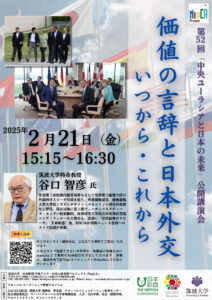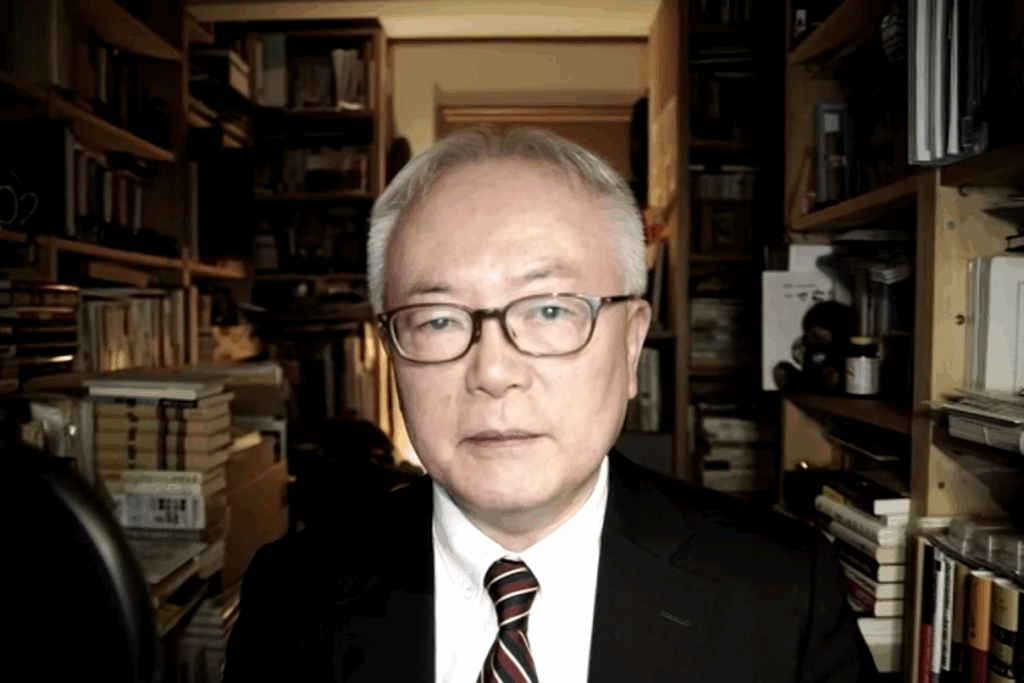On Friday, February 21, 2025, I held the 52nd public lecture, “The Future of Central Eurasia and Japan.” We invited Professor Taniguchi Tomohiko, a senior professor at the University of Tsukuba, to give a lecture titled “The Rhetoric of Values and Japanese Diplomacy: Since When and From Now.”
After a successful career as a reporter for “Nikkei Business,” Mr. Taniguchi was formally hired by the Ministry of Foreign Affairs in 2005. He has experience writing speeches for then-Foreign Minister Aso Taro and then-Prime Minister Abe Shinzo. After retiring in 2008, he held numerous important positions such as a full-time advisor for JR Tokai and a visiting professor at Meiji University. During the second Abe administration, he served as a special advisor to the Cabinet, handling foreign speeches for Prime Minister Abe Shinzo, playing an important role in disseminating Japan’s foreign policy.
In this lecture, he talked about the changes in Japan’s diplomatic style that occurred around 2005-2008, including the historical background and from an internal perspective.
Prior to around 2005, Japanese diplomacy did not touch on “value items” at all and focused primarily on providing educational support to help people in partner countries become self-reliant. At that time, Japan was one of the few countries capable of producing cars, color televisions, and semiconductors, leading the world both economically and industrially. Rather than merely providing financial assistance, Japan was offering support through “human resource development.”
Just at that turning point, Mr. Taniguchi was selected, and he was tasked with writing a speech for a lecture on Japanese diplomacy. And he witnesses Japan using “words of value” to communicate with the world for the first time. A prominent example is the speech “Arc of Freedom and Prosperity” by Aso Taro, in which the word “democracy” was explicitly used. Additionally, it was introduced that efforts are made to convey values using the term “good governance” in consideration of countries that feel resistance to democracy.
Additionally, the efforts to educate mid-level and senior bureaucrats and promote the concept of “good governance” were also introduced. For over 20 years, he has been inviting a total of 900 mid-level government officials from Central Asia (Uzbekistan, Kyrgyzstan, and Tajikistan) to Japan to provide training, and some of them are now taking on important positions. Although these efforts to contribute to “building a nation that can believe in the future” through diplomacy continue, the achievements are not sufficiently known, and Mr. Taniguchi expressed his frustration.
Furthermore, Abe’s diplomacy proposed the concept of a “Free and Open Indo-Pacific,” and in cooperation with India, Australia, and the United States, advocated for the notion of “maritime democracy.”
Mr. Taniguchi spoke about the dynamic change that has taken place in Japan, which has avoided using “word of values” in diplomacy (it has been Value Shy), but has since transformed into a country that speaks about its own values.
During the Q&A session, clear explanations were provided for questions such as why “words of value” were previously considered embarrassing, and whether there are countries that are skilled in diplomacy, making the lecture a highly informative experience.





